Early Childhood Education and Care: Importance of Inclusion, Strength-Based Approach, and Effective Team Collaboration
VerifiedAdded on 2023/04/25
|12
|3252
|249
AI Summary
Inclusion in early childhood education is crucial for all children, regardless of their differences. Inclusive education promotes diverse learners coexisting in undifferentiated classrooms, benefiting both disabled and non-disabled students. Inclusive teaching enhances teachers' awareness and allows them to develop positive attitudes towards all learners. Parents believe that inclusion positively impacts their children's social and emotional development, providing opportunities for participation in decision-making processes. The strength-based approach focuses on identifying and nurturing individual strengths rather than dwelling on deficiencies. It empowers learners, improves their self-perception, and transforms their learning experience. An effective team approach involving students, parents, and teachers creates an inclusive environment that values each child's abilities and fosters collaboration, communication, and mutual learning. This approach promotes a sense of belonging, respect for diversity, and community engagement.
Contribute Materials
Your contribution can guide someone’s learning journey. Share your
documents today.
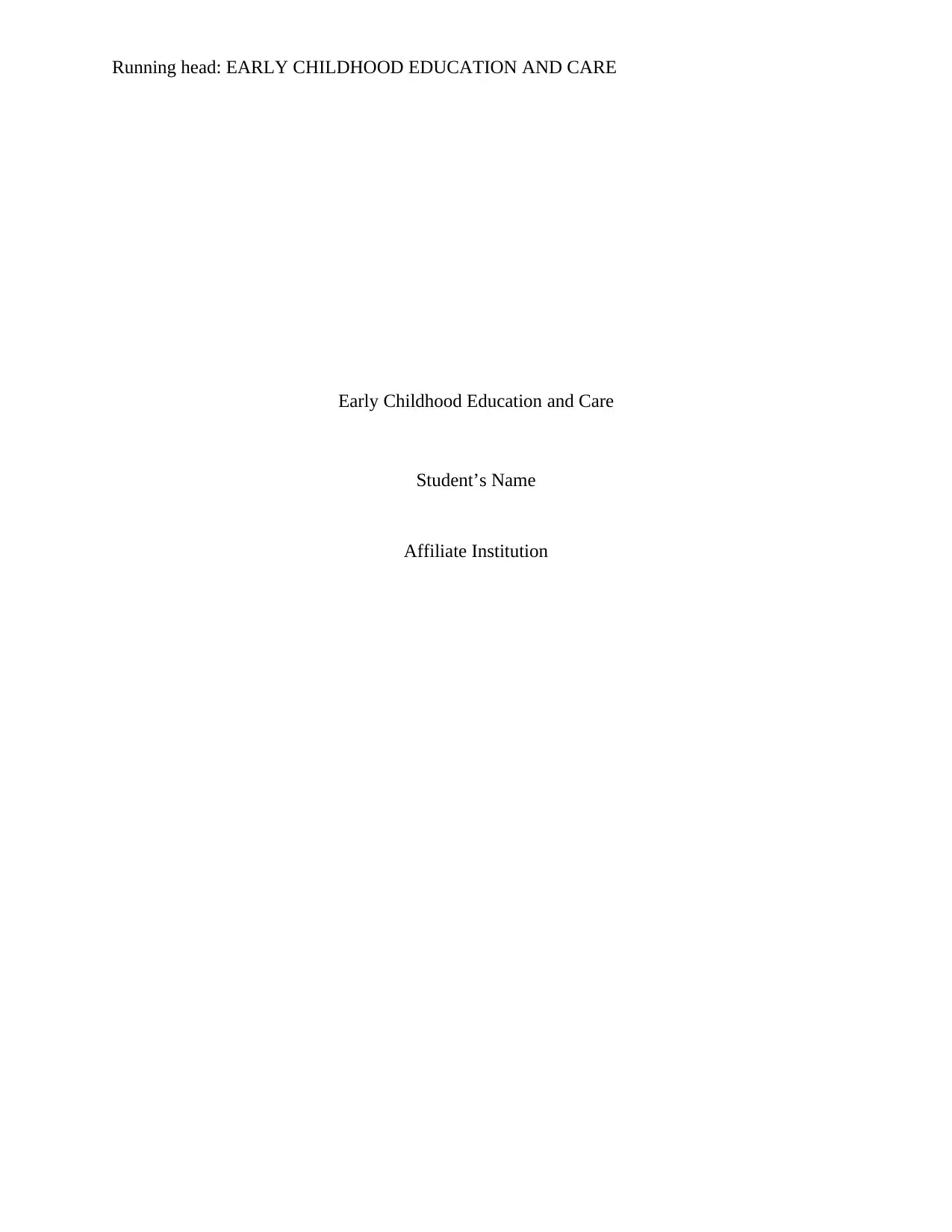
Running head: EARLY CHILDHOOD EDUCATION AND CARE
Early Childhood Education and Care
Student’s Name
Affiliate Institution
Early Childhood Education and Care
Student’s Name
Affiliate Institution
Secure Best Marks with AI Grader
Need help grading? Try our AI Grader for instant feedback on your assignments.
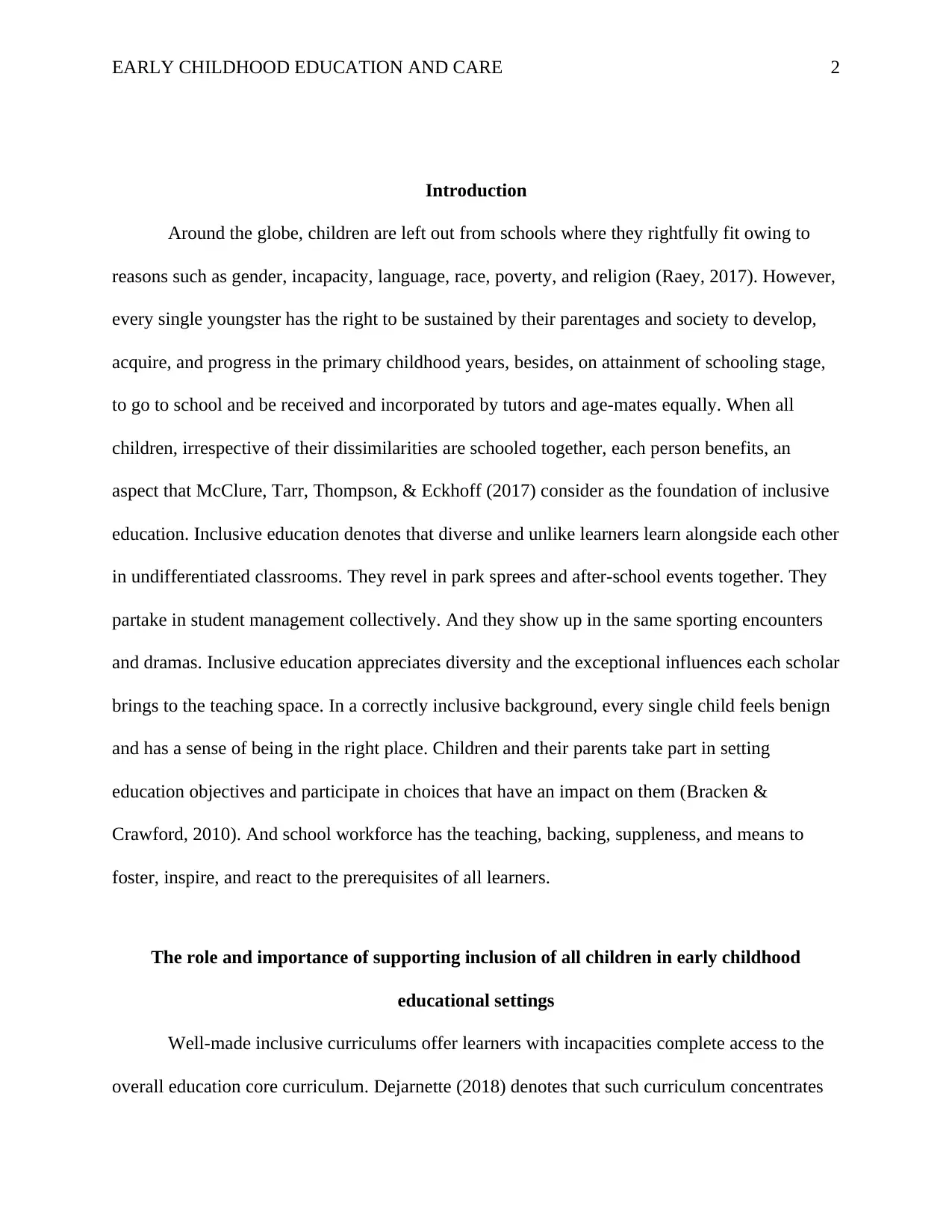
EARLY CHILDHOOD EDUCATION AND CARE 2
Introduction
Around the globe, children are left out from schools where they rightfully fit owing to
reasons such as gender, incapacity, language, race, poverty, and religion (Raey, 2017). However,
every single youngster has the right to be sustained by their parentages and society to develop,
acquire, and progress in the primary childhood years, besides, on attainment of schooling stage,
to go to school and be received and incorporated by tutors and age-mates equally. When all
children, irrespective of their dissimilarities are schooled together, each person benefits, an
aspect that McClure, Tarr, Thompson, & Eckhoff (2017) consider as the foundation of inclusive
education. Inclusive education denotes that diverse and unlike learners learn alongside each other
in undifferentiated classrooms. They revel in park sprees and after-school events together. They
partake in student management collectively. And they show up in the same sporting encounters
and dramas. Inclusive education appreciates diversity and the exceptional influences each scholar
brings to the teaching space. In a correctly inclusive background, every single child feels benign
and has a sense of being in the right place. Children and their parents take part in setting
education objectives and participate in choices that have an impact on them (Bracken &
Crawford, 2010). And school workforce has the teaching, backing, suppleness, and means to
foster, inspire, and react to the prerequisites of all learners.
The role and importance of supporting inclusion of all children in early childhood
educational settings
Well-made inclusive curriculums offer learners with incapacities complete access to the
overall education core curriculum. Dejarnette (2018) denotes that such curriculum concentrates
Introduction
Around the globe, children are left out from schools where they rightfully fit owing to
reasons such as gender, incapacity, language, race, poverty, and religion (Raey, 2017). However,
every single youngster has the right to be sustained by their parentages and society to develop,
acquire, and progress in the primary childhood years, besides, on attainment of schooling stage,
to go to school and be received and incorporated by tutors and age-mates equally. When all
children, irrespective of their dissimilarities are schooled together, each person benefits, an
aspect that McClure, Tarr, Thompson, & Eckhoff (2017) consider as the foundation of inclusive
education. Inclusive education denotes that diverse and unlike learners learn alongside each other
in undifferentiated classrooms. They revel in park sprees and after-school events together. They
partake in student management collectively. And they show up in the same sporting encounters
and dramas. Inclusive education appreciates diversity and the exceptional influences each scholar
brings to the teaching space. In a correctly inclusive background, every single child feels benign
and has a sense of being in the right place. Children and their parents take part in setting
education objectives and participate in choices that have an impact on them (Bracken &
Crawford, 2010). And school workforce has the teaching, backing, suppleness, and means to
foster, inspire, and react to the prerequisites of all learners.
The role and importance of supporting inclusion of all children in early childhood
educational settings
Well-made inclusive curriculums offer learners with incapacities complete access to the
overall education core curriculum. Dejarnette (2018) denotes that such curriculum concentrates
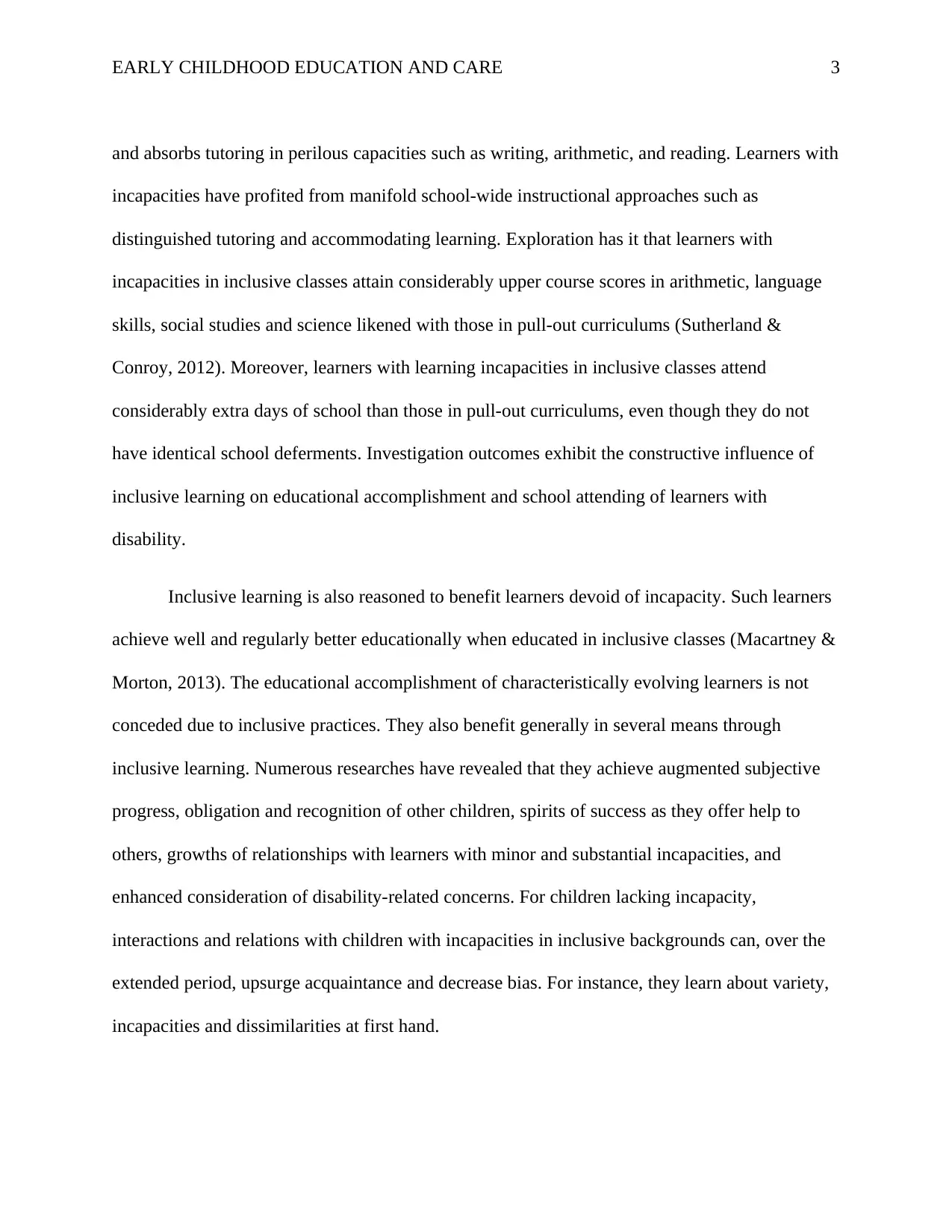
EARLY CHILDHOOD EDUCATION AND CARE 3
and absorbs tutoring in perilous capacities such as writing, arithmetic, and reading. Learners with
incapacities have profited from manifold school-wide instructional approaches such as
distinguished tutoring and accommodating learning. Exploration has it that learners with
incapacities in inclusive classes attain considerably upper course scores in arithmetic, language
skills, social studies and science likened with those in pull-out curriculums (Sutherland &
Conroy, 2012). Moreover, learners with learning incapacities in inclusive classes attend
considerably extra days of school than those in pull-out curriculums, even though they do not
have identical school deferments. Investigation outcomes exhibit the constructive influence of
inclusive learning on educational accomplishment and school attending of learners with
disability.
Inclusive learning is also reasoned to benefit learners devoid of incapacity. Such learners
achieve well and regularly better educationally when educated in inclusive classes (Macartney &
Morton, 2013). The educational accomplishment of characteristically evolving learners is not
conceded due to inclusive practices. They also benefit generally in several means through
inclusive learning. Numerous researches have revealed that they achieve augmented subjective
progress, obligation and recognition of other children, spirits of success as they offer help to
others, growths of relationships with learners with minor and substantial incapacities, and
enhanced consideration of disability-related concerns. For children lacking incapacity,
interactions and relations with children with incapacities in inclusive backgrounds can, over the
extended period, upsurge acquaintance and decrease bias. For instance, they learn about variety,
incapacities and dissimilarities at first hand.
and absorbs tutoring in perilous capacities such as writing, arithmetic, and reading. Learners with
incapacities have profited from manifold school-wide instructional approaches such as
distinguished tutoring and accommodating learning. Exploration has it that learners with
incapacities in inclusive classes attain considerably upper course scores in arithmetic, language
skills, social studies and science likened with those in pull-out curriculums (Sutherland &
Conroy, 2012). Moreover, learners with learning incapacities in inclusive classes attend
considerably extra days of school than those in pull-out curriculums, even though they do not
have identical school deferments. Investigation outcomes exhibit the constructive influence of
inclusive learning on educational accomplishment and school attending of learners with
disability.
Inclusive learning is also reasoned to benefit learners devoid of incapacity. Such learners
achieve well and regularly better educationally when educated in inclusive classes (Macartney &
Morton, 2013). The educational accomplishment of characteristically evolving learners is not
conceded due to inclusive practices. They also benefit generally in several means through
inclusive learning. Numerous researches have revealed that they achieve augmented subjective
progress, obligation and recognition of other children, spirits of success as they offer help to
others, growths of relationships with learners with minor and substantial incapacities, and
enhanced consideration of disability-related concerns. For children lacking incapacity,
interactions and relations with children with incapacities in inclusive backgrounds can, over the
extended period, upsurge acquaintance and decrease bias. For instance, they learn about variety,
incapacities and dissimilarities at first hand.
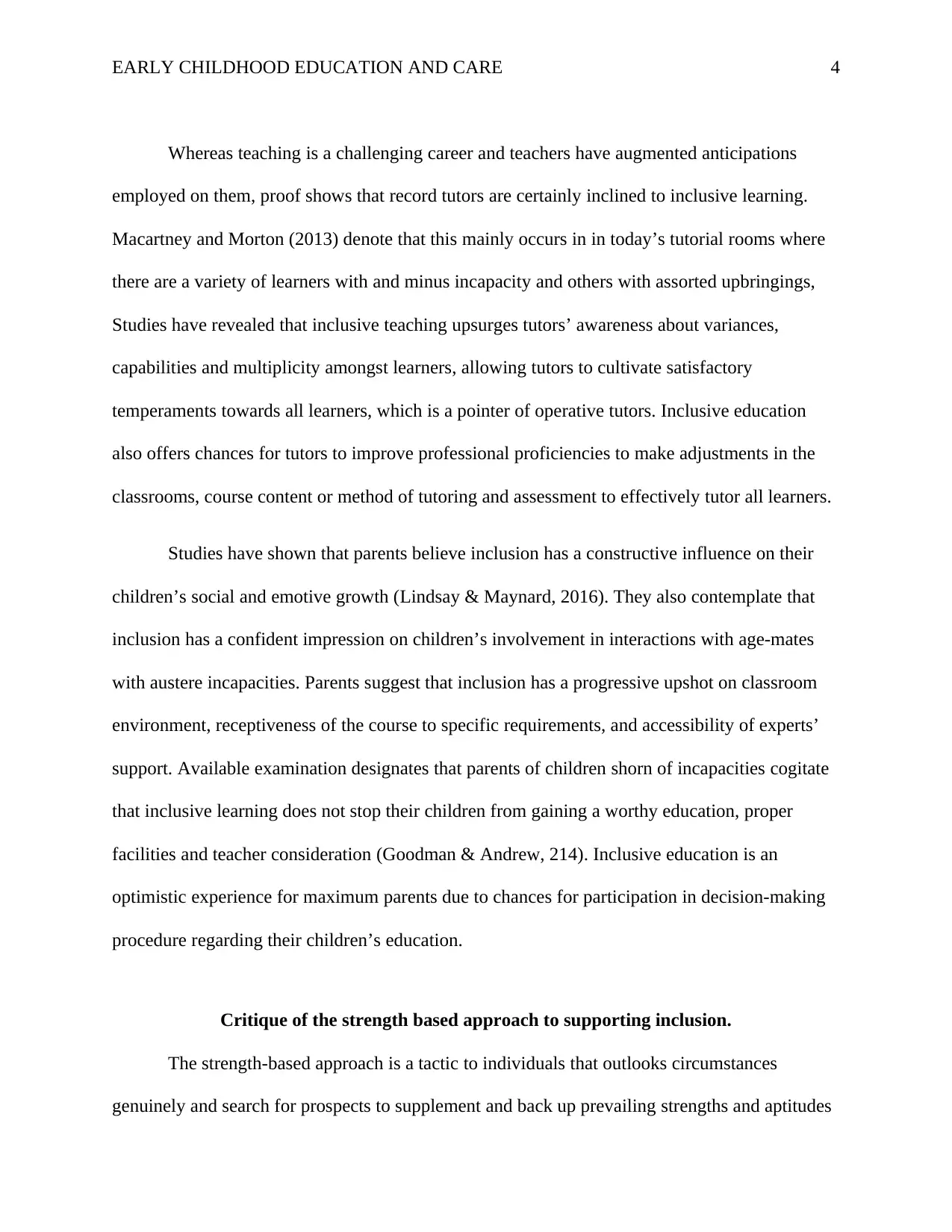
EARLY CHILDHOOD EDUCATION AND CARE 4
Whereas teaching is a challenging career and teachers have augmented anticipations
employed on them, proof shows that record tutors are certainly inclined to inclusive learning.
Macartney and Morton (2013) denote that this mainly occurs in in today’s tutorial rooms where
there are a variety of learners with and minus incapacity and others with assorted upbringings,
Studies have revealed that inclusive teaching upsurges tutors’ awareness about variances,
capabilities and multiplicity amongst learners, allowing tutors to cultivate satisfactory
temperaments towards all learners, which is a pointer of operative tutors. Inclusive education
also offers chances for tutors to improve professional proficiencies to make adjustments in the
classrooms, course content or method of tutoring and assessment to effectively tutor all learners.
Studies have shown that parents believe inclusion has a constructive influence on their
children’s social and emotive growth (Lindsay & Maynard, 2016). They also contemplate that
inclusion has a confident impression on children’s involvement in interactions with age-mates
with austere incapacities. Parents suggest that inclusion has a progressive upshot on classroom
environment, receptiveness of the course to specific requirements, and accessibility of experts’
support. Available examination designates that parents of children shorn of incapacities cogitate
that inclusive learning does not stop their children from gaining a worthy education, proper
facilities and teacher consideration (Goodman & Andrew, 214). Inclusive education is an
optimistic experience for maximum parents due to chances for participation in decision-making
procedure regarding their children’s education.
Critique of the strength based approach to supporting inclusion.
The strength-based approach is a tactic to individuals that outlooks circumstances
genuinely and search for prospects to supplement and back up prevailing strengths and aptitudes
Whereas teaching is a challenging career and teachers have augmented anticipations
employed on them, proof shows that record tutors are certainly inclined to inclusive learning.
Macartney and Morton (2013) denote that this mainly occurs in in today’s tutorial rooms where
there are a variety of learners with and minus incapacity and others with assorted upbringings,
Studies have revealed that inclusive teaching upsurges tutors’ awareness about variances,
capabilities and multiplicity amongst learners, allowing tutors to cultivate satisfactory
temperaments towards all learners, which is a pointer of operative tutors. Inclusive education
also offers chances for tutors to improve professional proficiencies to make adjustments in the
classrooms, course content or method of tutoring and assessment to effectively tutor all learners.
Studies have shown that parents believe inclusion has a constructive influence on their
children’s social and emotive growth (Lindsay & Maynard, 2016). They also contemplate that
inclusion has a confident impression on children’s involvement in interactions with age-mates
with austere incapacities. Parents suggest that inclusion has a progressive upshot on classroom
environment, receptiveness of the course to specific requirements, and accessibility of experts’
support. Available examination designates that parents of children shorn of incapacities cogitate
that inclusive learning does not stop their children from gaining a worthy education, proper
facilities and teacher consideration (Goodman & Andrew, 214). Inclusive education is an
optimistic experience for maximum parents due to chances for participation in decision-making
procedure regarding their children’s education.
Critique of the strength based approach to supporting inclusion.
The strength-based approach is a tactic to individuals that outlooks circumstances
genuinely and search for prospects to supplement and back up prevailing strengths and aptitudes
Secure Best Marks with AI Grader
Need help grading? Try our AI Grader for instant feedback on your assignments.
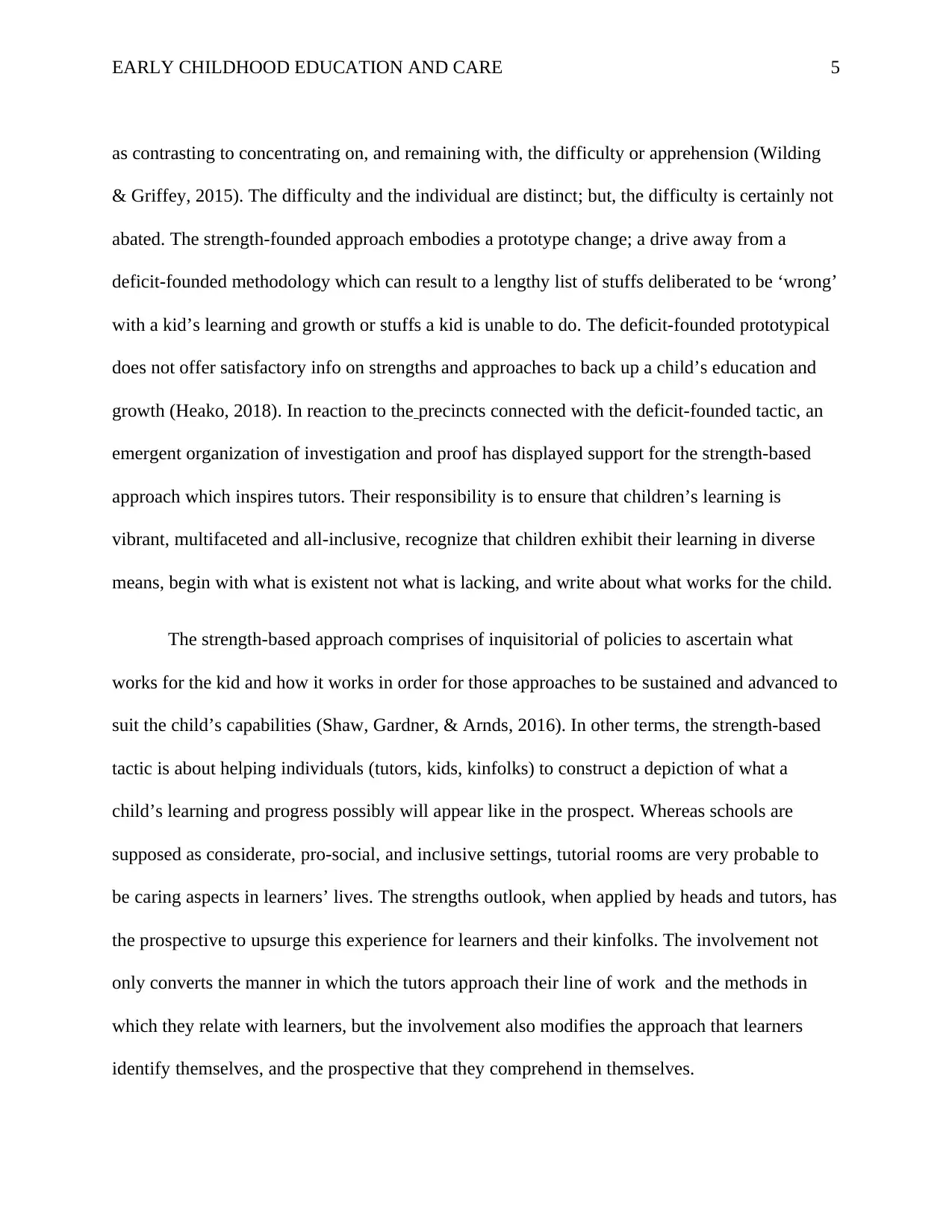
EARLY CHILDHOOD EDUCATION AND CARE 5
as contrasting to concentrating on, and remaining with, the difficulty or apprehension (Wilding
& Griffey, 2015). The difficulty and the individual are distinct; but, the difficulty is certainly not
abated. The strength-founded approach embodies a prototype change; a drive away from a
deficit-founded methodology which can result to a lengthy list of stuffs deliberated to be ‘wrong’
with a kid’s learning and growth or stuffs a kid is unable to do. The deficit-founded prototypical
does not offer satisfactory info on strengths and approaches to back up a child’s education and
growth (Heako, 2018). In reaction to the precincts connected with the deficit-founded tactic, an
emergent organization of investigation and proof has displayed support for the strength-based
approach which inspires tutors. Their responsibility is to ensure that children’s learning is
vibrant, multifaceted and all-inclusive, recognize that children exhibit their learning in diverse
means, begin with what is existent not what is lacking, and write about what works for the child.
The strength-based approach comprises of inquisitorial of policies to ascertain what
works for the kid and how it works in order for those approaches to be sustained and advanced to
suit the child’s capabilities (Shaw, Gardner, & Arnds, 2016). In other terms, the strength-based
tactic is about helping individuals (tutors, kids, kinfolks) to construct a depiction of what a
child’s learning and progress possibly will appear like in the prospect. Whereas schools are
supposed as considerate, pro-social, and inclusive settings, tutorial rooms are very probable to
be caring aspects in learners’ lives. The strengths outlook, when applied by heads and tutors, has
the prospective to upsurge this experience for learners and their kinfolks. The involvement not
only converts the manner in which the tutors approach their line of work and the methods in
which they relate with learners, but the involvement also modifies the approach that learners
identify themselves, and the prospective that they comprehend in themselves.
as contrasting to concentrating on, and remaining with, the difficulty or apprehension (Wilding
& Griffey, 2015). The difficulty and the individual are distinct; but, the difficulty is certainly not
abated. The strength-founded approach embodies a prototype change; a drive away from a
deficit-founded methodology which can result to a lengthy list of stuffs deliberated to be ‘wrong’
with a kid’s learning and growth or stuffs a kid is unable to do. The deficit-founded prototypical
does not offer satisfactory info on strengths and approaches to back up a child’s education and
growth (Heako, 2018). In reaction to the precincts connected with the deficit-founded tactic, an
emergent organization of investigation and proof has displayed support for the strength-based
approach which inspires tutors. Their responsibility is to ensure that children’s learning is
vibrant, multifaceted and all-inclusive, recognize that children exhibit their learning in diverse
means, begin with what is existent not what is lacking, and write about what works for the child.
The strength-based approach comprises of inquisitorial of policies to ascertain what
works for the kid and how it works in order for those approaches to be sustained and advanced to
suit the child’s capabilities (Shaw, Gardner, & Arnds, 2016). In other terms, the strength-based
tactic is about helping individuals (tutors, kids, kinfolks) to construct a depiction of what a
child’s learning and progress possibly will appear like in the prospect. Whereas schools are
supposed as considerate, pro-social, and inclusive settings, tutorial rooms are very probable to
be caring aspects in learners’ lives. The strengths outlook, when applied by heads and tutors, has
the prospective to upsurge this experience for learners and their kinfolks. The involvement not
only converts the manner in which the tutors approach their line of work and the methods in
which they relate with learners, but the involvement also modifies the approach that learners
identify themselves, and the prospective that they comprehend in themselves.
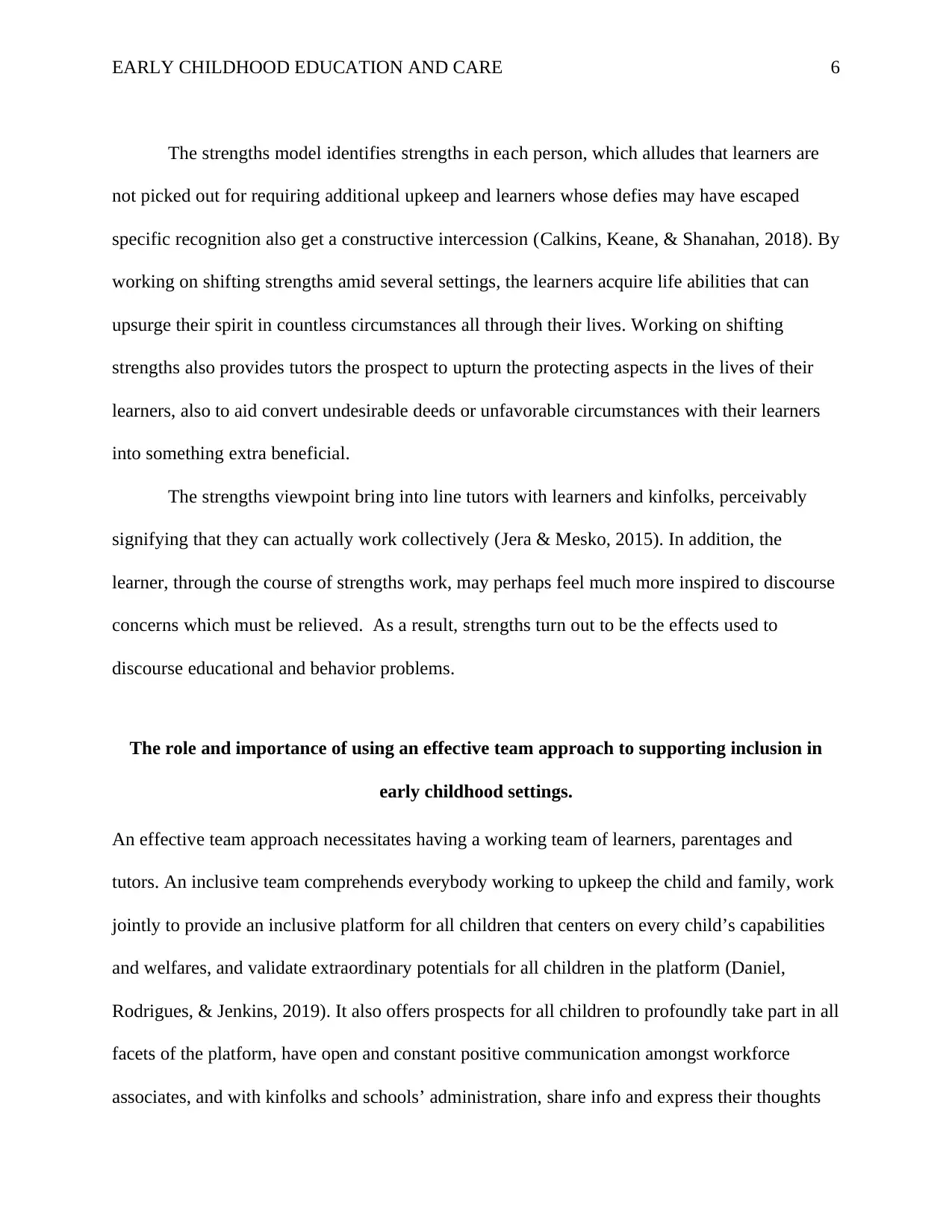
EARLY CHILDHOOD EDUCATION AND CARE 6
The strengths model identifies strengths in each person, which alludes that learners are
not picked out for requiring additional upkeep and learners whose defies may have escaped
specific recognition also get a constructive intercession (Calkins, Keane, & Shanahan, 2018). By
working on shifting strengths amid several settings, the learners acquire life abilities that can
upsurge their spirit in countless circumstances all through their lives. Working on shifting
strengths also provides tutors the prospect to upturn the protecting aspects in the lives of their
learners, also to aid convert undesirable deeds or unfavorable circumstances with their learners
into something extra beneficial.
The strengths viewpoint bring into line tutors with learners and kinfolks, perceivably
signifying that they can actually work collectively (Jera & Mesko, 2015). In addition, the
learner, through the course of strengths work, may perhaps feel much more inspired to discourse
concerns which must be relieved. As a result, strengths turn out to be the effects used to
discourse educational and behavior problems.
The role and importance of using an effective team approach to supporting inclusion in
early childhood settings.
An effective team approach necessitates having a working team of learners, parentages and
tutors. An inclusive team comprehends everybody working to upkeep the child and family, work
jointly to provide an inclusive platform for all children that centers on every child’s capabilities
and welfares, and validate extraordinary potentials for all children in the platform (Daniel,
Rodrigues, & Jenkins, 2019). It also offers prospects for all children to profoundly take part in all
facets of the platform, have open and constant positive communication amongst workforce
associates, and with kinfolks and schools’ administration, share info and express their thoughts
The strengths model identifies strengths in each person, which alludes that learners are
not picked out for requiring additional upkeep and learners whose defies may have escaped
specific recognition also get a constructive intercession (Calkins, Keane, & Shanahan, 2018). By
working on shifting strengths amid several settings, the learners acquire life abilities that can
upsurge their spirit in countless circumstances all through their lives. Working on shifting
strengths also provides tutors the prospect to upturn the protecting aspects in the lives of their
learners, also to aid convert undesirable deeds or unfavorable circumstances with their learners
into something extra beneficial.
The strengths viewpoint bring into line tutors with learners and kinfolks, perceivably
signifying that they can actually work collectively (Jera & Mesko, 2015). In addition, the
learner, through the course of strengths work, may perhaps feel much more inspired to discourse
concerns which must be relieved. As a result, strengths turn out to be the effects used to
discourse educational and behavior problems.
The role and importance of using an effective team approach to supporting inclusion in
early childhood settings.
An effective team approach necessitates having a working team of learners, parentages and
tutors. An inclusive team comprehends everybody working to upkeep the child and family, work
jointly to provide an inclusive platform for all children that centers on every child’s capabilities
and welfares, and validate extraordinary potentials for all children in the platform (Daniel,
Rodrigues, & Jenkins, 2019). It also offers prospects for all children to profoundly take part in all
facets of the platform, have open and constant positive communication amongst workforce
associates, and with kinfolks and schools’ administration, share info and express their thoughts
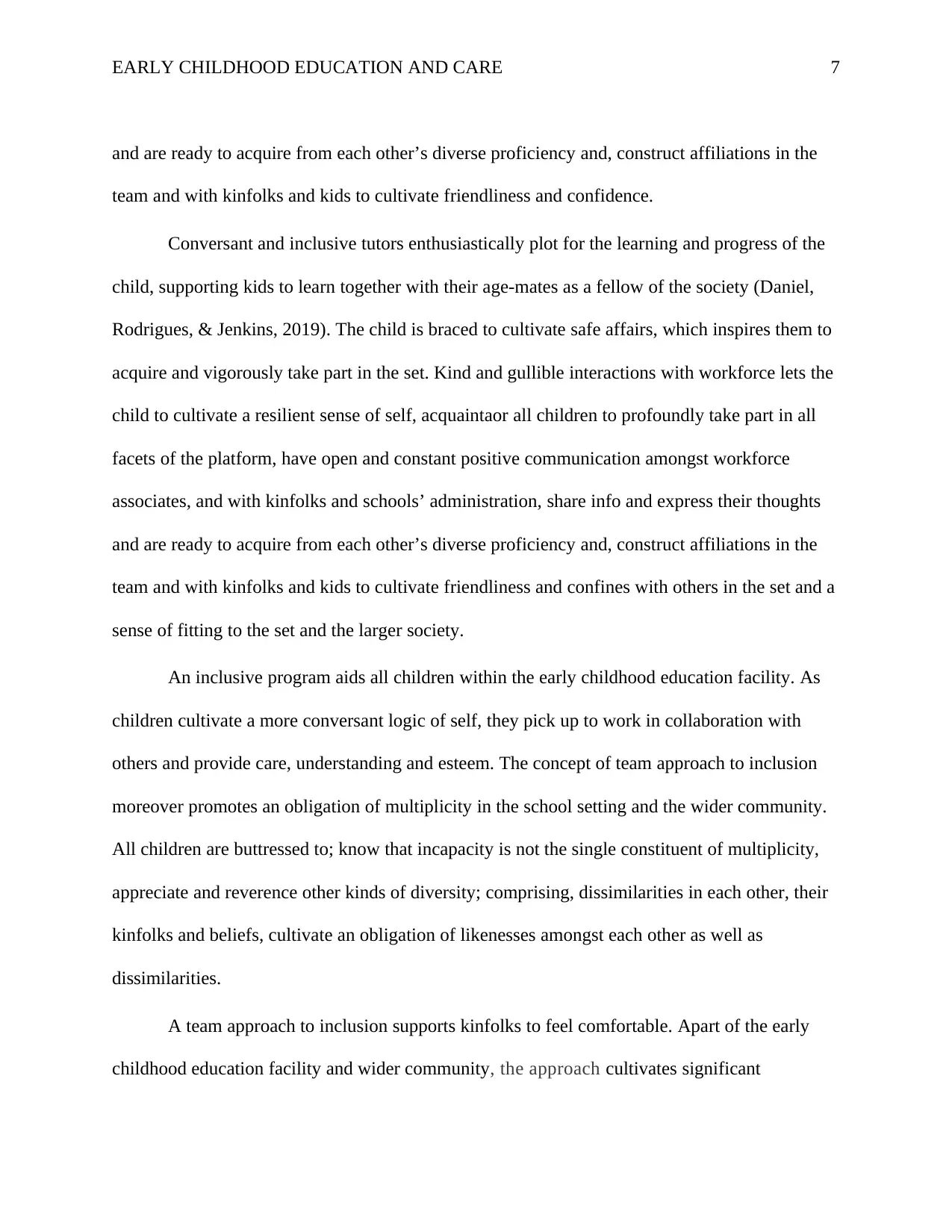
EARLY CHILDHOOD EDUCATION AND CARE 7
and are ready to acquire from each other’s diverse proficiency and, construct affiliations in the
team and with kinfolks and kids to cultivate friendliness and confidence.
Conversant and inclusive tutors enthusiastically plot for the learning and progress of the
child, supporting kids to learn together with their age-mates as a fellow of the society (Daniel,
Rodrigues, & Jenkins, 2019). The child is braced to cultivate safe affairs, which inspires them to
acquire and vigorously take part in the set. Kind and gullible interactions with workforce lets the
child to cultivate a resilient sense of self, acquaintaor all children to profoundly take part in all
facets of the platform, have open and constant positive communication amongst workforce
associates, and with kinfolks and schools’ administration, share info and express their thoughts
and are ready to acquire from each other’s diverse proficiency and, construct affiliations in the
team and with kinfolks and kids to cultivate friendliness and confines with others in the set and a
sense of fitting to the set and the larger society.
An inclusive program aids all children within the early childhood education facility. As
children cultivate a more conversant logic of self, they pick up to work in collaboration with
others and provide care, understanding and esteem. The concept of team approach to inclusion
moreover promotes an obligation of multiplicity in the school setting and the wider community.
All children are buttressed to; know that incapacity is not the single constituent of multiplicity,
appreciate and reverence other kinds of diversity; comprising, dissimilarities in each other, their
kinfolks and beliefs, cultivate an obligation of likenesses amongst each other as well as
dissimilarities.
A team approach to inclusion supports kinfolks to feel comfortable. Apart of the early
childhood education facility and wider community, the approach cultivates significant
and are ready to acquire from each other’s diverse proficiency and, construct affiliations in the
team and with kinfolks and kids to cultivate friendliness and confidence.
Conversant and inclusive tutors enthusiastically plot for the learning and progress of the
child, supporting kids to learn together with their age-mates as a fellow of the society (Daniel,
Rodrigues, & Jenkins, 2019). The child is braced to cultivate safe affairs, which inspires them to
acquire and vigorously take part in the set. Kind and gullible interactions with workforce lets the
child to cultivate a resilient sense of self, acquaintaor all children to profoundly take part in all
facets of the platform, have open and constant positive communication amongst workforce
associates, and with kinfolks and schools’ administration, share info and express their thoughts
and are ready to acquire from each other’s diverse proficiency and, construct affiliations in the
team and with kinfolks and kids to cultivate friendliness and confines with others in the set and a
sense of fitting to the set and the larger society.
An inclusive program aids all children within the early childhood education facility. As
children cultivate a more conversant logic of self, they pick up to work in collaboration with
others and provide care, understanding and esteem. The concept of team approach to inclusion
moreover promotes an obligation of multiplicity in the school setting and the wider community.
All children are buttressed to; know that incapacity is not the single constituent of multiplicity,
appreciate and reverence other kinds of diversity; comprising, dissimilarities in each other, their
kinfolks and beliefs, cultivate an obligation of likenesses amongst each other as well as
dissimilarities.
A team approach to inclusion supports kinfolks to feel comfortable. Apart of the early
childhood education facility and wider community, the approach cultivates significant
Paraphrase This Document
Need a fresh take? Get an instant paraphrase of this document with our AI Paraphraser
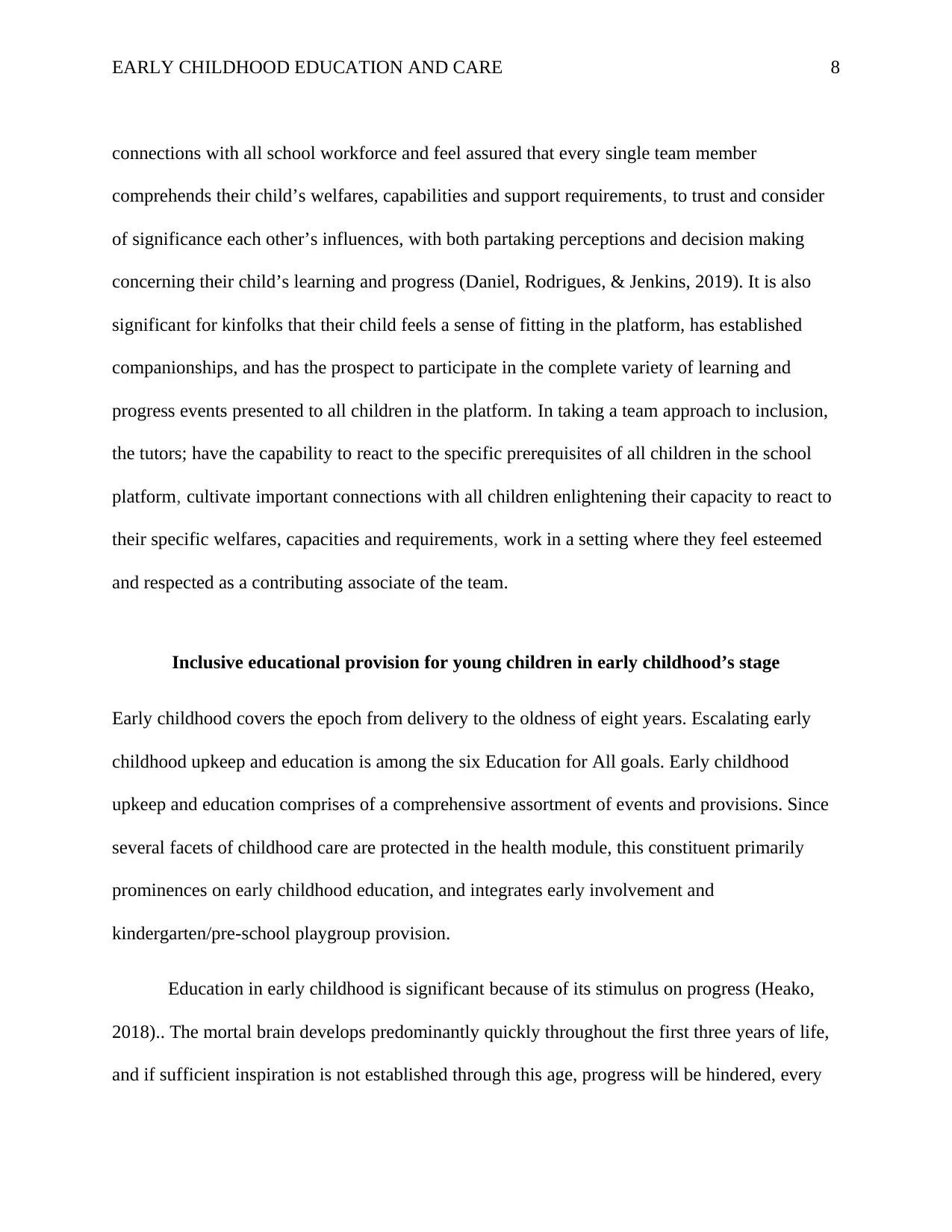
EARLY CHILDHOOD EDUCATION AND CARE 8
connections with all school workforce and feel assured that every single team member
comprehends their child’s welfares, capabilities and support requirements, to trust and consider
of significance each other’s influences, with both partaking perceptions and decision making
concerning their child’s learning and progress (Daniel, Rodrigues, & Jenkins, 2019). It is also
significant for kinfolks that their child feels a sense of fitting in the platform, has established
companionships, and has the prospect to participate in the complete variety of learning and
progress events presented to all children in the platform. In taking a team approach to inclusion,
the tutors; have the capability to react to the specific prerequisites of all children in the school
platform, cultivate important connections with all children enlightening their capacity to react to
their specific welfares, capacities and requirements, work in a setting where they feel esteemed
and respected as a contributing associate of the team.
Inclusive educational provision for young children in early childhood’s stage
Early childhood covers the epoch from delivery to the oldness of eight years. Escalating early
childhood upkeep and education is among the six Education for All goals. Early childhood
upkeep and education comprises of a comprehensive assortment of events and provisions. Since
several facets of childhood care are protected in the health module, this constituent primarily
prominences on early childhood education, and integrates early involvement and
kindergarten/pre-school playgroup provision.
Education in early childhood is significant because of its stimulus on progress (Heako,
2018).. The mortal brain develops predominantly quickly throughout the first three years of life,
and if sufficient inspiration is not established through this age, progress will be hindered, every
connections with all school workforce and feel assured that every single team member
comprehends their child’s welfares, capabilities and support requirements, to trust and consider
of significance each other’s influences, with both partaking perceptions and decision making
concerning their child’s learning and progress (Daniel, Rodrigues, & Jenkins, 2019). It is also
significant for kinfolks that their child feels a sense of fitting in the platform, has established
companionships, and has the prospect to participate in the complete variety of learning and
progress events presented to all children in the platform. In taking a team approach to inclusion,
the tutors; have the capability to react to the specific prerequisites of all children in the school
platform, cultivate important connections with all children enlightening their capacity to react to
their specific welfares, capacities and requirements, work in a setting where they feel esteemed
and respected as a contributing associate of the team.
Inclusive educational provision for young children in early childhood’s stage
Early childhood covers the epoch from delivery to the oldness of eight years. Escalating early
childhood upkeep and education is among the six Education for All goals. Early childhood
upkeep and education comprises of a comprehensive assortment of events and provisions. Since
several facets of childhood care are protected in the health module, this constituent primarily
prominences on early childhood education, and integrates early involvement and
kindergarten/pre-school playgroup provision.
Education in early childhood is significant because of its stimulus on progress (Heako,
2018).. The mortal brain develops predominantly quickly throughout the first three years of life,
and if sufficient inspiration is not established through this age, progress will be hindered, every
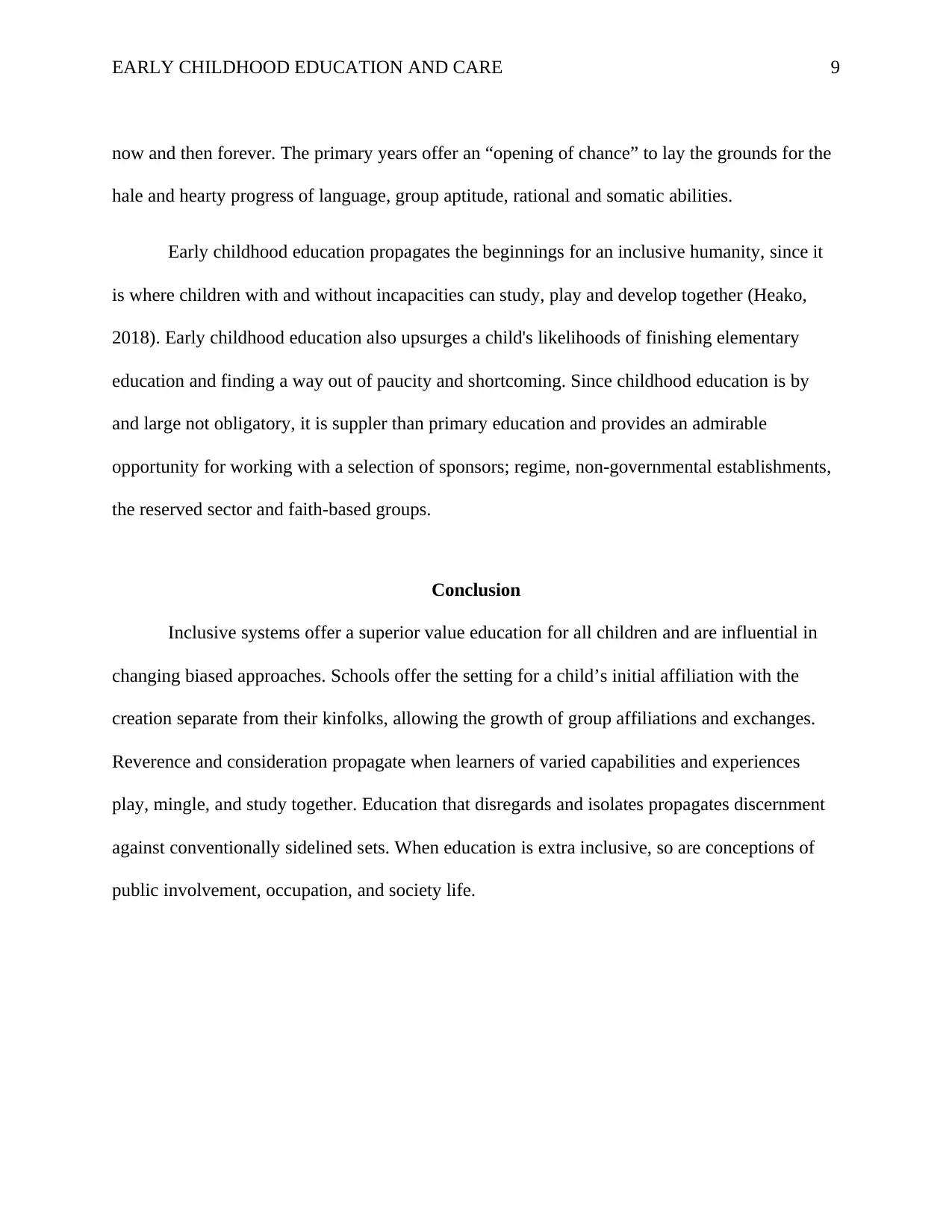
EARLY CHILDHOOD EDUCATION AND CARE 9
now and then forever. The primary years offer an “opening of chance” to lay the grounds for the
hale and hearty progress of language, group aptitude, rational and somatic abilities.
Early childhood education propagates the beginnings for an inclusive humanity, since it
is where children with and without incapacities can study, play and develop together (Heako,
2018). Early childhood education also upsurges a child's likelihoods of finishing elementary
education and finding a way out of paucity and shortcoming. Since childhood education is by
and large not obligatory, it is suppler than primary education and provides an admirable
opportunity for working with a selection of sponsors; regime, non-governmental establishments,
the reserved sector and faith-based groups.
Conclusion
Inclusive systems offer a superior value education for all children and are influential in
changing biased approaches. Schools offer the setting for a child’s initial affiliation with the
creation separate from their kinfolks, allowing the growth of group affiliations and exchanges.
Reverence and consideration propagate when learners of varied capabilities and experiences
play, mingle, and study together. Education that disregards and isolates propagates discernment
against conventionally sidelined sets. When education is extra inclusive, so are conceptions of
public involvement, occupation, and society life.
now and then forever. The primary years offer an “opening of chance” to lay the grounds for the
hale and hearty progress of language, group aptitude, rational and somatic abilities.
Early childhood education propagates the beginnings for an inclusive humanity, since it
is where children with and without incapacities can study, play and develop together (Heako,
2018). Early childhood education also upsurges a child's likelihoods of finishing elementary
education and finding a way out of paucity and shortcoming. Since childhood education is by
and large not obligatory, it is suppler than primary education and provides an admirable
opportunity for working with a selection of sponsors; regime, non-governmental establishments,
the reserved sector and faith-based groups.
Conclusion
Inclusive systems offer a superior value education for all children and are influential in
changing biased approaches. Schools offer the setting for a child’s initial affiliation with the
creation separate from their kinfolks, allowing the growth of group affiliations and exchanges.
Reverence and consideration propagate when learners of varied capabilities and experiences
play, mingle, and study together. Education that disregards and isolates propagates discernment
against conventionally sidelined sets. When education is extra inclusive, so are conceptions of
public involvement, occupation, and society life.
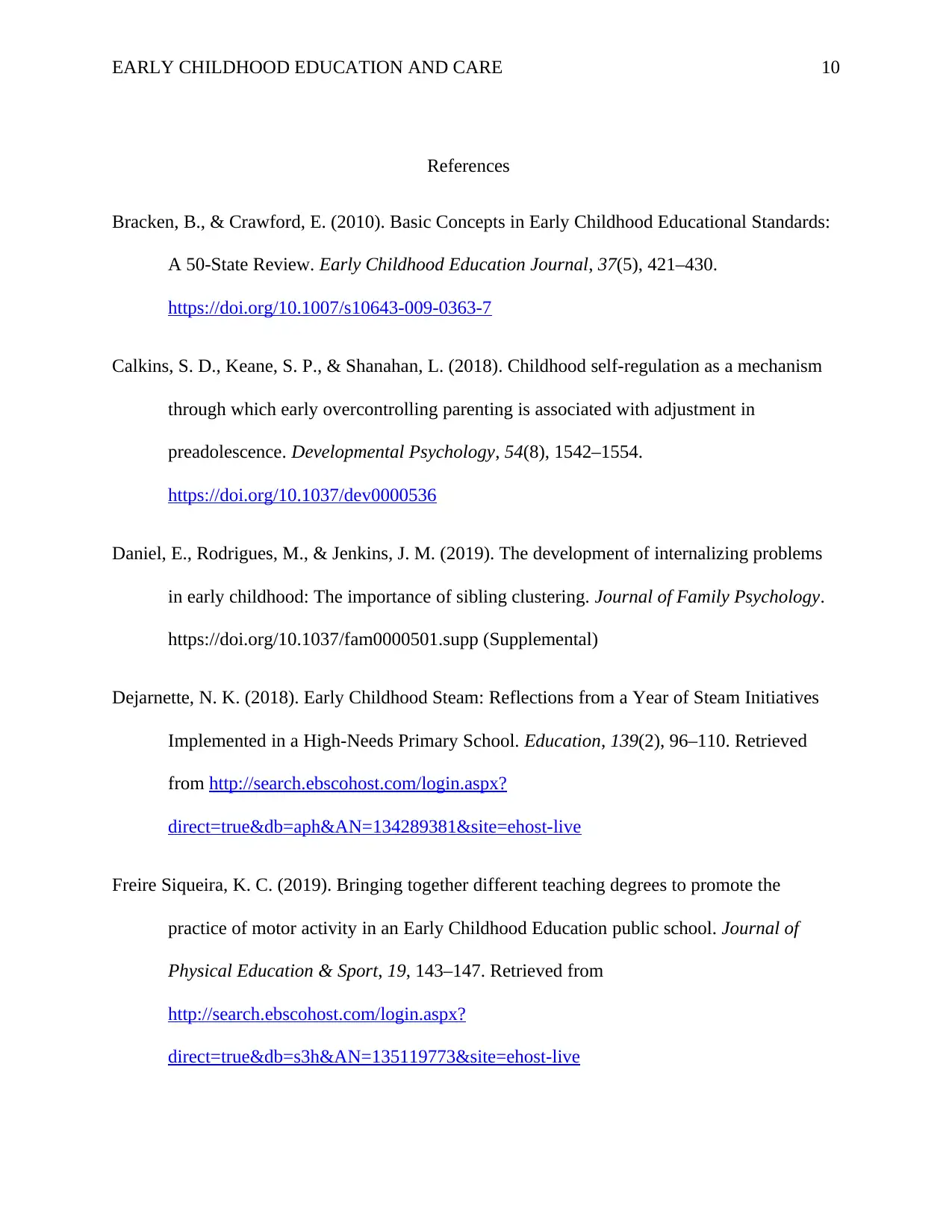
EARLY CHILDHOOD EDUCATION AND CARE 10
References
Bracken, B., & Crawford, E. (2010). Basic Concepts in Early Childhood Educational Standards:
A 50-State Review. Early Childhood Education Journal, 37(5), 421–430.
https://doi.org/10.1007/s10643-009-0363-7
Calkins, S. D., Keane, S. P., & Shanahan, L. (2018). Childhood self-regulation as a mechanism
through which early overcontrolling parenting is associated with adjustment in
preadolescence. Developmental Psychology, 54(8), 1542–1554.
https://doi.org/10.1037/dev0000536
Daniel, E., Rodrigues, M., & Jenkins, J. M. (2019). The development of internalizing problems
in early childhood: The importance of sibling clustering. Journal of Family Psychology.
https://doi.org/10.1037/fam0000501.supp (Supplemental)
Dejarnette, N. K. (2018). Early Childhood Steam: Reflections from a Year of Steam Initiatives
Implemented in a High-Needs Primary School. Education, 139(2), 96–110. Retrieved
from http://search.ebscohost.com/login.aspx?
direct=true&db=aph&AN=134289381&site=ehost-live
Freire Siqueira, K. C. (2019). Bringing together different teaching degrees to promote the
practice of motor activity in an Early Childhood Education public school. Journal of
Physical Education & Sport, 19, 143–147. Retrieved from
http://search.ebscohost.com/login.aspx?
direct=true&db=s3h&AN=135119773&site=ehost-live
References
Bracken, B., & Crawford, E. (2010). Basic Concepts in Early Childhood Educational Standards:
A 50-State Review. Early Childhood Education Journal, 37(5), 421–430.
https://doi.org/10.1007/s10643-009-0363-7
Calkins, S. D., Keane, S. P., & Shanahan, L. (2018). Childhood self-regulation as a mechanism
through which early overcontrolling parenting is associated with adjustment in
preadolescence. Developmental Psychology, 54(8), 1542–1554.
https://doi.org/10.1037/dev0000536
Daniel, E., Rodrigues, M., & Jenkins, J. M. (2019). The development of internalizing problems
in early childhood: The importance of sibling clustering. Journal of Family Psychology.
https://doi.org/10.1037/fam0000501.supp (Supplemental)
Dejarnette, N. K. (2018). Early Childhood Steam: Reflections from a Year of Steam Initiatives
Implemented in a High-Needs Primary School. Education, 139(2), 96–110. Retrieved
from http://search.ebscohost.com/login.aspx?
direct=true&db=aph&AN=134289381&site=ehost-live
Freire Siqueira, K. C. (2019). Bringing together different teaching degrees to promote the
practice of motor activity in an Early Childhood Education public school. Journal of
Physical Education & Sport, 19, 143–147. Retrieved from
http://search.ebscohost.com/login.aspx?
direct=true&db=s3h&AN=135119773&site=ehost-live
Secure Best Marks with AI Grader
Need help grading? Try our AI Grader for instant feedback on your assignments.
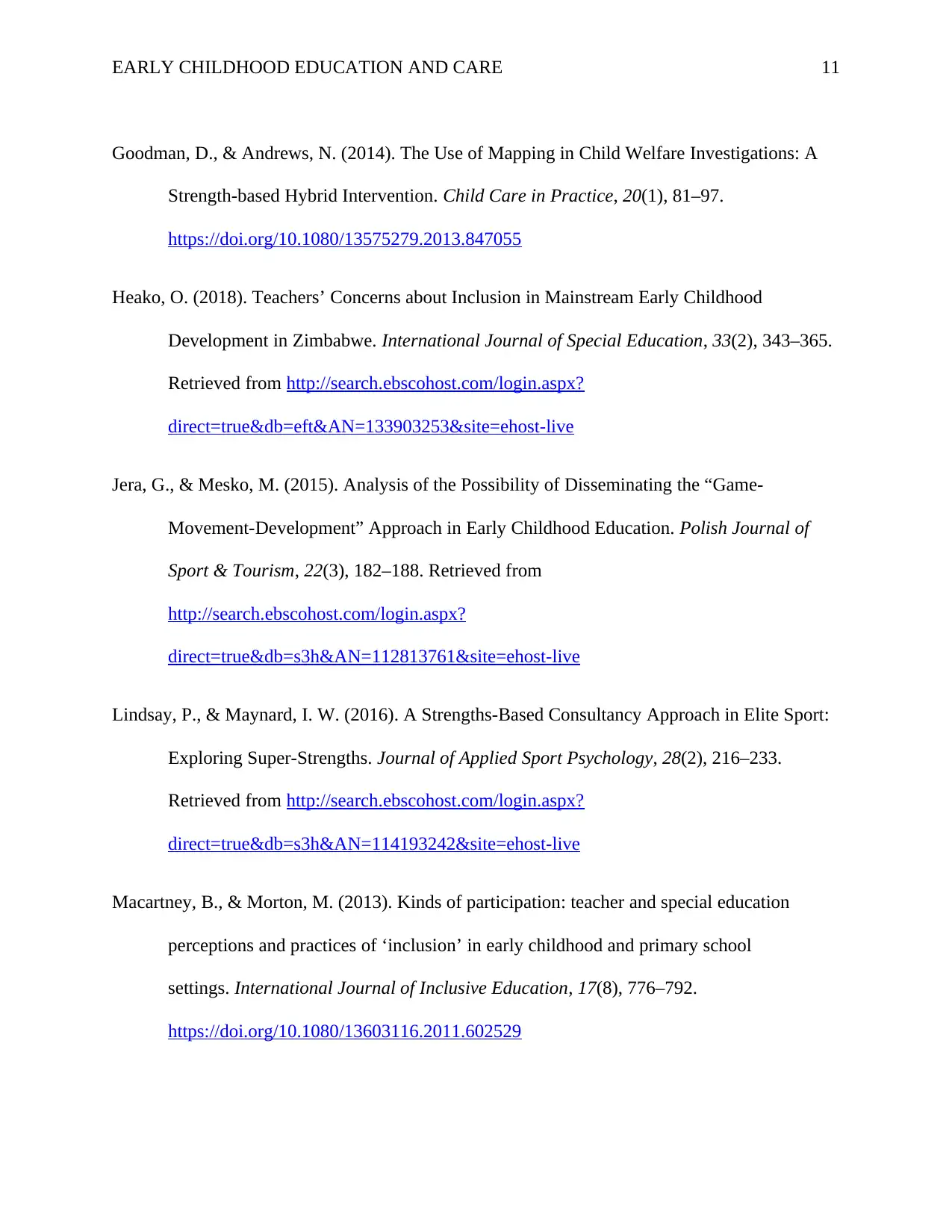
EARLY CHILDHOOD EDUCATION AND CARE 11
Goodman, D., & Andrews, N. (2014). The Use of Mapping in Child Welfare Investigations: A
Strength-based Hybrid Intervention. Child Care in Practice, 20(1), 81–97.
https://doi.org/10.1080/13575279.2013.847055
Heako, O. (2018). Teachers’ Concerns about Inclusion in Mainstream Early Childhood
Development in Zimbabwe. International Journal of Special Education, 33(2), 343–365.
Retrieved from http://search.ebscohost.com/login.aspx?
direct=true&db=eft&AN=133903253&site=ehost-live
Jera, G., & Mesko, M. (2015). Analysis of the Possibility of Disseminating the “Game-
Movement-Development” Approach in Early Childhood Education. Polish Journal of
Sport & Tourism, 22(3), 182–188. Retrieved from
http://search.ebscohost.com/login.aspx?
direct=true&db=s3h&AN=112813761&site=ehost-live
Lindsay, P., & Maynard, I. W. (2016). A Strengths-Based Consultancy Approach in Elite Sport:
Exploring Super-Strengths. Journal of Applied Sport Psychology, 28(2), 216–233.
Retrieved from http://search.ebscohost.com/login.aspx?
direct=true&db=s3h&AN=114193242&site=ehost-live
Macartney, B., & Morton, M. (2013). Kinds of participation: teacher and special education
perceptions and practices of ‘inclusion’ in early childhood and primary school
settings. International Journal of Inclusive Education, 17(8), 776–792.
https://doi.org/10.1080/13603116.2011.602529
Goodman, D., & Andrews, N. (2014). The Use of Mapping in Child Welfare Investigations: A
Strength-based Hybrid Intervention. Child Care in Practice, 20(1), 81–97.
https://doi.org/10.1080/13575279.2013.847055
Heako, O. (2018). Teachers’ Concerns about Inclusion in Mainstream Early Childhood
Development in Zimbabwe. International Journal of Special Education, 33(2), 343–365.
Retrieved from http://search.ebscohost.com/login.aspx?
direct=true&db=eft&AN=133903253&site=ehost-live
Jera, G., & Mesko, M. (2015). Analysis of the Possibility of Disseminating the “Game-
Movement-Development” Approach in Early Childhood Education. Polish Journal of
Sport & Tourism, 22(3), 182–188. Retrieved from
http://search.ebscohost.com/login.aspx?
direct=true&db=s3h&AN=112813761&site=ehost-live
Lindsay, P., & Maynard, I. W. (2016). A Strengths-Based Consultancy Approach in Elite Sport:
Exploring Super-Strengths. Journal of Applied Sport Psychology, 28(2), 216–233.
Retrieved from http://search.ebscohost.com/login.aspx?
direct=true&db=s3h&AN=114193242&site=ehost-live
Macartney, B., & Morton, M. (2013). Kinds of participation: teacher and special education
perceptions and practices of ‘inclusion’ in early childhood and primary school
settings. International Journal of Inclusive Education, 17(8), 776–792.
https://doi.org/10.1080/13603116.2011.602529
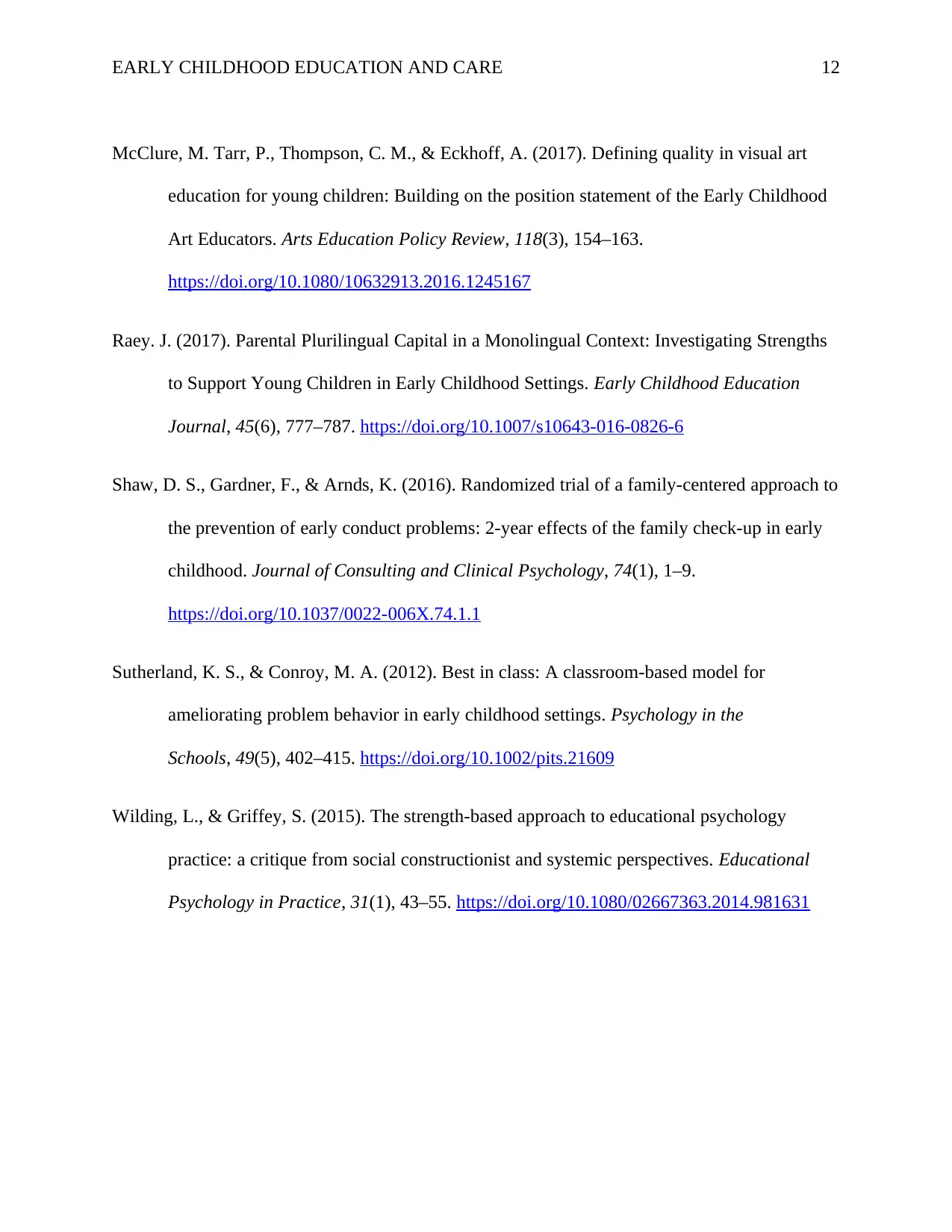
EARLY CHILDHOOD EDUCATION AND CARE 12
McClure, M. Tarr, P., Thompson, C. M., & Eckhoff, A. (2017). Defining quality in visual art
education for young children: Building on the position statement of the Early Childhood
Art Educators. Arts Education Policy Review, 118(3), 154–163.
https://doi.org/10.1080/10632913.2016.1245167
Raey. J. (2017). Parental Plurilingual Capital in a Monolingual Context: Investigating Strengths
to Support Young Children in Early Childhood Settings. Early Childhood Education
Journal, 45(6), 777–787. https://doi.org/10.1007/s10643-016-0826-6
Shaw, D. S., Gardner, F., & Arnds, K. (2016). Randomized trial of a family-centered approach to
the prevention of early conduct problems: 2-year effects of the family check-up in early
childhood. Journal of Consulting and Clinical Psychology, 74(1), 1–9.
https://doi.org/10.1037/0022-006X.74.1.1
Sutherland, K. S., & Conroy, M. A. (2012). Best in class: A classroom-based model for
ameliorating problem behavior in early childhood settings. Psychology in the
Schools, 49(5), 402–415. https://doi.org/10.1002/pits.21609
Wilding, L., & Griffey, S. (2015). The strength-based approach to educational psychology
practice: a critique from social constructionist and systemic perspectives. Educational
Psychology in Practice, 31(1), 43–55. https://doi.org/10.1080/02667363.2014.981631
McClure, M. Tarr, P., Thompson, C. M., & Eckhoff, A. (2017). Defining quality in visual art
education for young children: Building on the position statement of the Early Childhood
Art Educators. Arts Education Policy Review, 118(3), 154–163.
https://doi.org/10.1080/10632913.2016.1245167
Raey. J. (2017). Parental Plurilingual Capital in a Monolingual Context: Investigating Strengths
to Support Young Children in Early Childhood Settings. Early Childhood Education
Journal, 45(6), 777–787. https://doi.org/10.1007/s10643-016-0826-6
Shaw, D. S., Gardner, F., & Arnds, K. (2016). Randomized trial of a family-centered approach to
the prevention of early conduct problems: 2-year effects of the family check-up in early
childhood. Journal of Consulting and Clinical Psychology, 74(1), 1–9.
https://doi.org/10.1037/0022-006X.74.1.1
Sutherland, K. S., & Conroy, M. A. (2012). Best in class: A classroom-based model for
ameliorating problem behavior in early childhood settings. Psychology in the
Schools, 49(5), 402–415. https://doi.org/10.1002/pits.21609
Wilding, L., & Griffey, S. (2015). The strength-based approach to educational psychology
practice: a critique from social constructionist and systemic perspectives. Educational
Psychology in Practice, 31(1), 43–55. https://doi.org/10.1080/02667363.2014.981631
1 out of 12
Related Documents
Your All-in-One AI-Powered Toolkit for Academic Success.
+13062052269
info@desklib.com
Available 24*7 on WhatsApp / Email
![[object Object]](/_next/static/media/star-bottom.7253800d.svg)
Unlock your academic potential
© 2024 | Zucol Services PVT LTD | All rights reserved.





